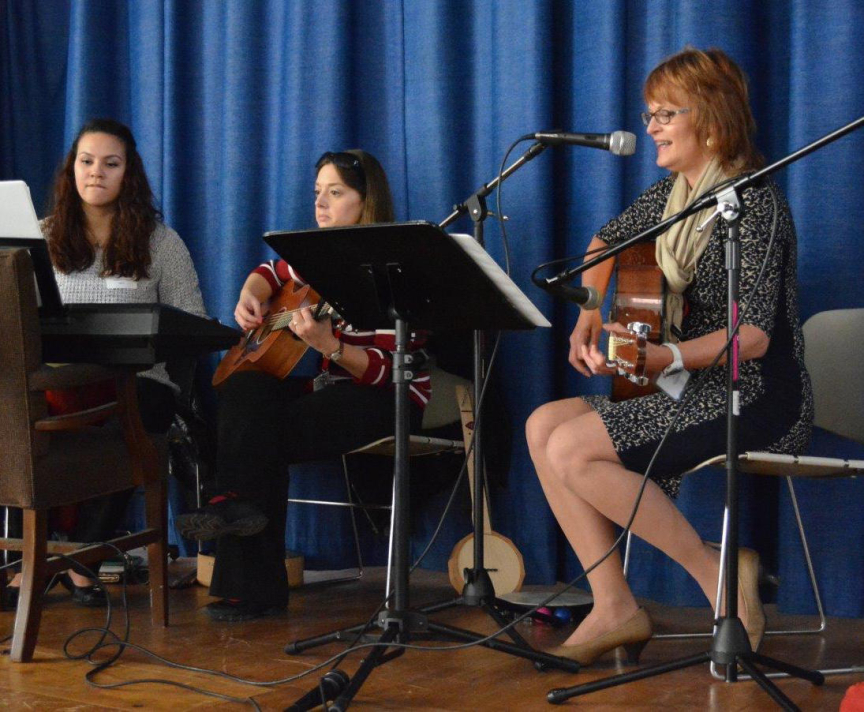Prisoners Find Hope Through Music
A music therapy program at Edna Mahan Correctional Facility for Women directed by Rutgers helps inmates manage stress and seeks to reduce recidivism

‘Participating in music therapy may be one of few times when a troubled person can constructively reflect on herself and choose a better way of living.’
–Karen Anne Melendez
To an audience of fellow inmates and correctional staff, a woman read an original poem that told her story of loss and regret: “Being away from you tears me apart, and I know that I love you with all of my heart. So, I’ll do what it takes, and I’ll show in the end, that one day you’ll have back your mother again.”
Presented in a measured, lyric tone, the poem was as much an open letter from the woman to her daughter as it was a therapeutic form of creative expression.
“It took a lot of courage for her to put her feelings on paper and even more to say these words out loud in front of a group,” says Karen Anne Melendez, a board-certified music therapist at Rutgers University Correctional Health Care, who directs the music therapy program at Edna Mahan Correctional Facility for Women in Clinton. “Sometimes progress comes in tiny steps, sometimes in leaps and bounds.”
The poetry reading was part of a bi-annual concert, which incorporates original songwriting, singing of popular songs and spoken-word performances that inmates produce as part of their therapy.
Melendez launched the music therapy program at Edna Mahan in 2005. Since then, it has become a model for female correctional institutions locally and across the nation.
Her patients are residents of “C Cottage,” which houses inmates designated as having “special needs” – women who require behavioral health care for conditions such as addiction, post-traumatic stress, chronic mental illness or personality disorders.
“These patients often are suffering from trauma and depression and can be aggressive, resist authority and have unstable personal relationships – symptoms that if left unaddressed may lead to violence,” says Melendez. “Music therapy gives them an opportunity to safely channel their anger and frustration, increase their self esteem, cope with stress and connect positively with others.”
Studies have shown that female offenders are good candidates for music therapy since they are more open than men to arts-oriented approaches to therapy, are eager to learn new skills and often want to improve their environments.
“Some patients want to actively engage in music, while others respond better to listening,” she says. “We also have patients who are more interested in art or writing, so their therapy is more based on writing poetry and songs or designing the decorations for the concert.”

Melendez and her interns use a variety of techniques to help inmates find an outlet for their emotions. For example, patients listen to music while meditating or practicing yoga, explore songs’ meanings in relation to their own lives, create rhythms as a team, join sing-a-longs, play games like “Name that Tune” or learn an instrument. “The activities are geared to normalize the patients and get them stimulated about what is going on in the world,” says Melendez.
The therapy also allows patients to confront feelings they have suppressed and learn coping skills. “We see expressions of pain and sadness, but the music provides just enough support to allow them to have the chance to build on their strengths and blossom,” she says.
The concert preparation, lasting four to six weeks, helps the women build social skills. “Working constructively as a team toward a positive goal is something many of them have never experienced in their life,” Melendez says.
Since the start of the program, Melendez has produced 23 concerts – each with their own variations and surprises. For example, the most recent concert included a short, theatrical performance of Shel Silverstein’s “The Giving Tree,” produced by intern Deborah Heagen, who has a background in theater.
“This was the first time we included acting, which allowed the group to explore improvisation,” says Melendez. “We also assigned a patient who has a passion for writing raps to create the skit’s theme song. Allowing patients to actively participate shows them that they can experience joy in being creative.”
Melendez’s goal is that patients will continue to use music therapeutically on their own after they leave prison. “Participating in music therapy may be one of few times when a troubled person can constructively reflect on herself and choose a better way of living,” she says. “It’s easy to get caught up in the system and reoffending. We’re teaching them how to pause before making a drastic decision and returning to prison. Life is too precious.”
For more information, contact Patti Verbanas at 848-932-0551 or verbanpa@ucm.rutgers.edu